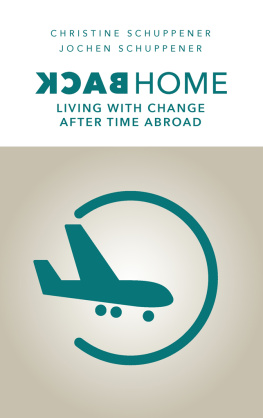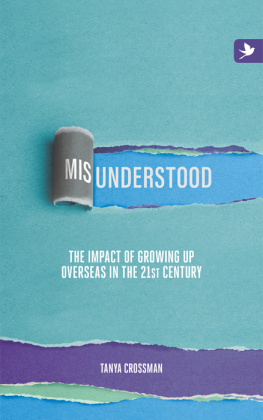ISBN 97837 41229626
2016 Jochen und Christine Schuppener
Production and Publisher: BODBooks on Demand GmbH, Norderstedt Original title: Rckkehr aus dem Ausland 2015
All rights reserved. No part of this book may be reproduced in any form without permission in writing from the authors, except in the case of brief quotations embodied in critical articles or reviews.
Translation: Karen Alberg, Michael Zabel
Author Portrait: Sonia Epple
Cover, typography and illustrations: Daniel Zabel
INHALT
INTRODUCTION
For many years we have assisted people in their return process to their homeland. Time and time again we realized how important a well-planned process is for a successful reintegration experience.
It all started with our own return after having spent eight years abroad. From observing other former expats we knew that reintegration does not simply happen. We observed that some had real challenges coming back to their homeland. On the other hand, we had received much support from friends towards the end of our stay. They asked us questions to reflect upon our time abroad. A good farewell with small, but significant rituals was very helpful for our entire family. We also realized that our childrens home was actually in the host nation, abroad. Germany was the country where Grandma and Grandpa lived. The people there were quite different.
Also, we had changed. We were not aware of those changes, which usually became apparent with misunderstandings and unexpected conflicts. Our experiences developed our desire to support others in similar situations. Since that time, we have been able to support expats from all over the world in this important stage so they, too, could experience successful reintegration to their homelands.
An intense period of life abroad lies behind you. You experienced many milestonessome positive, and some challenging. And now you are heading back. Through our consultations and seminars as intercultural counselors, we try to emphasize how the valuable experiences from the previous years as an expat can be included in the very important process of returning to the homeland. It is our desire to encourage you and to give you practical advice as you embark on this journey.
We want to thank those whom we have been able to support over the past years. It has been a privilege to be part of this important process with each of you. Many ideas for this book came as responses to our clients needs.
When returning home after many intense years abroad, many people think, No problem, I know whats up. This will be quite easy, unlike my departure when I did not have a clue.
However, the reintegration of expats poses a problem to many companies and organizations.
While most companies offer in-service and training for preparing for the stay abroad, it is hard to find reintegration programs. Only 14% of surveyed companies have a formal repatriation strategy.
The return to the home country is often characterized by a feeling of being somehow in the wrong place, of not fitting in, and of being like a stranger. Usually questions start coming up shortly after the initial joy of returning home, such as:
- How do I find my place at work and in society?
- What do I need now? What do my spouse and our children need?
- Does anyone understand me?
A good reintegration starts before the actual physical return. Those who start thinking about this process early enough create the best foundation for a successful return and reintegration.
Above all, the experiences gained abroad can enrich ones life, giving new perspectives and energy. But that does not happen automatically.
This book will give you a new perspective about the dynamics of return home. You will find many handy hints and practical ideas for a successful reintegration.
80% of those who go abroad travel with their spouse, and more than 60% travel with their family; therefore, we also will give ideas to support your relationships, both with your spouse and your children.
We hope you enjoy reading, pondering, and applying this book to your unique situation.
We are grateful for feedback on this important subject. Please feel free to share your experiences and questions to
Jochen and Christine Schuppener
Leaving
THE RIGHT TIMING
Feeling at home in a foreign country! That sounds really good. After some initial uncertainties about cultural dos and don`ts, you navigated your way through. You recognized that some rules from your country of origin, do not apply here. Of course you still drop a brick ones in while, but that is part of being here. You came to appreciate the new culture, you know where to get what you need, and you became accustomed to the language. Everything feels normalsomewhat like home. Does that sound familiar to you?
Or did you find it more difficult? You never really understood the people here, and you usually felt like an outsider. You are glad that it is over now.
Or was it more like this? The locals were not the problem, but rather you had trouble with your international colleagues. To which culture should you adapt? You preferred the company of your native-language community.
It could also be that you did not want to return home at all. It was your organization or company, the government authorities, or the age of your children that forced you to come back.
DOES TIME ABROAD EVEN MAKE SENSE?
Experiences abroad are valuable. Studies show that time spent abroad has positive effects on everyone involvedfor you, your spouse, and your children (who accompany 60% of those who go abroad). This is why we often address families in this book.
The advantages of gaining experience abroad include:
- Positive personal development
- Increased mobility
- Ability to adapt to new environments and people
- Global vision and perspectives
- Ability to build meaningful relationships in a short amount of time
- International network
- Language skills
- Intercultural knowledge
- Intercultural sensitivity
- Ability to perform well in a cross-cultural setting
And now you are supposed to return home. You have mixed thoughts, feelings, hopes, and maybe even worries and fears.
HOW INTEGRATED ARE YOU?
At first you experienced some fundamental changes in your life habits. You had to learn how to finish the daily vocational routine. Finding a good rhythm was not easy. Figuring out where and how to bring in your skills was another challenge. Would you make friends? How would you get along with your new colleagues while dealing with the language barrier? In addition to new co-workers, you may have been working with an international team. Now, after the fact, you can say that, along with various challenges, you have enjoyed many positive experiences.
For example:
- You have been accepted by your local colleagues, and overall you are comfortable with your work.
- You are happy with your new home.
- You have settled in the team.
- You are able function in your new environment, even though it still may present challenges.
- Your children are well-integrated in their schools.
Next page














